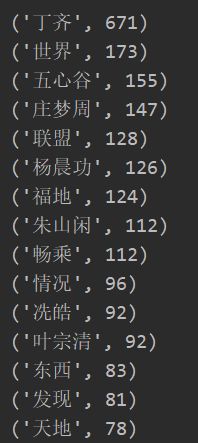- Elasticsearch:使用阿里云 AI 服务进行向量化和重新排名
作者:来自ElasticTomásMurúa在本文中,我们将介绍如何将阿里云AI功能与Elasticsearch集成,以提高语义搜索的相关性。阿里云人工智能搜索是一种将高级人工智能功能与Elasticsearch工具相结合的解决方案,利用QwenLLM/DeepSeek-R1系列提供高级推理和分类模型。在本文中,我们将使用同一作者撰写的小说和戏剧的描述来测试阿里巴巴重新排名和稀疏嵌入端点。步骤创建
- 从零开始搭建Zabbix监控系统:安装配置全攻略,轻松掌握企业级监控利器
磐基Stack专业服务团队
Zabbixzabbixadb
#作者:stackofumbrella文章目录前提安装及配置开始安装设置mysql编码开始安装查询是否启动成功编译安装zabbix前提selinux关闭#vim/etc/selinux/configSELINUX=disabled#setenforce0关闭防火墙#systemctlstopfirewalldyum安装mysql检查系统是否安装其他版本的MYSQL#yumlistinstalled
- Ubuntu中 json 打包数据的使用
猫猫的小茶馆
嵌入式软件开发ubuntujsonlinux服务器网络mcu
1.JSON的概念和作用为了避免不同平台下的字节对齐、类型大小不统一的问题,json库把数据封装成具有一定格式的字符流数据,进行传输。json格式:把数据与键值一一对应,数据传输双方约定好同一键值,使用接口API根据键值操作json对象(json_object)存储或取得数据。一般使用:数据-->(封装)json对象-->String格式-->...传输。。。-->String格式-->(解析)j
- 实现一个 RDMA 用户态驱动程序
写在前面随着DeepSeek的火爆,当众人将目光集中到模型优化时,底层网络通信基础设施的重要性往往容易被忽略。实际上,高性能、易维护、易定制的网络基础设施对于提升AI训练、推理的效率是至关重要的一环。目前,主流的高性能网络通信方案基本被几家头部公司垄断,其提供的标准API接口也已经被精心封装,绝大多数开发者无需关心底层实现细节。达坦科技始终致力于国产高性能网络基础设施解决方案的研发,深知网络通信基
- Linux C多人网络聊天室
HWY_猿
网络编程多人网络聊天室Linux网络聊天室聊天室LinuxC多人网络聊天室
经过好几天的日夜奋斗,总算把这个聊天室给做出来了,虽然说不上多好,但也是这几天从早到晚劳动的成功,所以就写这篇博文来记录一下啦。别的不敢说,确保能用就是了,完整代码在最后哦~当然啦,如果有幸被转发,还请注明来处哈~一、功能这个Linux下C版本的多人网络聊天室具备以下几个基本功能(或者说需求):(一)C/S模式,IPv4的TCP通信;(二)客户端登录需要账号密码,没有账号需要注册;(三)服务器每接
- MySQL存储引擎:MyISAM和InnoDB的区别
随风飘雁
数据库mysql数据库
1、MySQL存储引擎的发展MySQL数据库的存储引擎经历了多年的发展,以下是MySQL存储引擎的主要发展历程:MyISAM(默认存储引擎):MyISAM是MySQL最早的存储引擎,支持表级锁定和高速读取。它是MySQL的默认存储引擎,支持全文索引和压缩表等功能。但是,MyISAM不支持事务处理和外键约束等功能,这使得它的应用受到一定限制。InnoDB:InnoDB是MySQL的另一种存储引擎,支
- 智能推送系统的敏感词过滤功能:合规防线与用户体验的守护者
大数据
在信息爆炸与监管趋严的双重挑战下,APP企业正面临前所未有的内容安全压力。一次不当推送可能引发用户投诉、应用下架甚至法律诉讼。MobPush智能推送系统的敏感词过滤功能,通过技术手段在推送内容发布前自动拦截违规信息,已成为企业规避风险、维护品牌声誉的核心工具。数据显示,引入该功能后,APP的违规内容投诉率平均下降75%,人工审核成本减少60%。本文将从技术逻辑、业务价值及典型案例三个维度,解析这一
- 智能推送系统的敏感词过滤功能:合规防线与用户体验的守护者
大数据
在信息爆炸与监管趋严的双重挑战下,APP企业正面临前所未有的内容安全压力。一次不当推送可能引发用户投诉、应用下架甚至法律诉讼。MobPush智能推送系统的敏感词过滤功能,通过技术手段在推送内容发布前自动拦截违规信息,已成为企业规避风险、维护品牌声誉的核心工具。数据显示,引入该功能后,APP的违规内容投诉率平均下降75%,人工审核成本减少60%。本文将从技术逻辑、业务价值及典型案例三个维度,解析这一
- 提升物流效率,减少错误:板栗看板为你打造完美物流管理体验
项目管理软件
利用板栗看板优化物流管理,可以通过其可视化的任务管理、团队协作和实时跟踪功能,提升物流效率、减少错误并增强团队协作。以下是具体的优化方法和步骤:明确物流管理流程在开始使用板栗看板之前,先梳理企业的物流管理流程,明确各个环节(如订单接收、库存管理、运输调度、配送跟踪等)。将这些环节映射到看板中,形成清晰的工作流。示例看板列:○待处理订单○库存准备中○运输中○已送达○问题处理创建任务卡片将每个物流任务
- 掌握MCN运营主动权:优化工具助你抢占市场先机
项目管理软件
板栗看板作为一款强大的任务管理和团队协作工具,能够显著协助MCN(多频道网络)开展工作。以下详细分析板栗看板如何助力MCN提升运营效率和管理水平:一、任务分配与进度跟踪可视化任务管理○板栗看板通过可视化的看板视图,使MCN能够清晰地看到每个任务的分配情况、进度状态以及优先级。○每个任务卡片都包含详细信息,如负责人、截止日期、任务描述等,便于团队成员快速了解任务要求。灵活的任务分配○MCN管理者可以
- 阿根廷总统 Milei 谈 Libra 代币风波:从初衷到反思
区块链智能合约web3
作者:Techub热点速递采访媒体:TodoNoticias整理:Tia,TechubNews编者按:关于阿根廷总统哈维尔·米莱(JavierMilei)与代币LIBRA事件的风波,近日依然未曾平息。从他公开为项目站台到推文风波引发的广泛关注,一场复杂的政治与经济博弈正在阿根廷上演。与此同时,涉及该事件的资金流向、参与者范围以及后续的舆论反响,逐步揭示了其中错综复杂的内幕。总统米莱在接受采访时,坦
- 从云端到私有:智慧任务管理工具的私有化转型之路
项目管理软件
智慧任务管理工具私有化是指将智慧任务管理工具部署在组织内部的私有服务器或云环境中,以确保数据的安全性、隐私性和完全控制权。以下是对智慧任务管理工具私有化的详细解析:一、私有化的优势●数据安全:私有化部署确保所有数据存储在组织内部的服务器或私有云中,避免数据泄露或被第三方访问,特别适合处理敏感信息或需要遵守数据保护法规(如GDPR、HIPAA等)的组织。●定制化开发:组织可以完全控制系统的配置、更新
- 构建专属工作流:私有化部署下的数据安全与效率双赢
项目管理软件
工作流管理软件私有化是指将工作流管理软件部署在组织内部的私有服务器或专有云环境中,以确保数据的安全性、隐私性和组织的完全控制权。以下是对工作流管理软件私有化的详细分析:一、私有化的优势数据安全:○私有化部署确保所有数据存储在组织内部的服务器或私有云中,避免了数据泄露或被第三方访问的风险。○特别适合处理敏感信息或需要遵守数据保护法规(如GDPR、HIPAA等)的组织。定制化开发:○组织可以完全控制系
- 公然上线传销项目,Web3 的底线已经被无限突破
比特币智能合约区块链web3
作者:Techub热点速递撰文:Yangz,TechubNews今天早些时候,OKX将上线PI的消息在圈内引起轩然大波,对于上线被板上钉钉为传销盘子的「项目」,TechubNews联系了OKX公关,但对方拒绝置评。与此同时,Bitget也跟随OKX的步伐,宣布将上线PI。说起PI(派币或π币),想必全行业的人都知道是典型的传销项目,专门「收割」中老年群体。该项目自称由斯坦福大学博士创业推出,并冠以
- 打造卓越工程:工程管理工具如何重塑工作流程
团队协作工具
板栗看板作为一款工程管理软件,在项目管理、任务协同、知识笔记以及个人待办等多个方面展现出其独特的优势。以下是对板栗看板在工程管理方面的详细分析:一、核心功能任务可视化管理○板栗看板采用可视化的看板系统,用户可以将任务以卡片的形式展示在看板上,并轻松拖动卡片以显示任务的不同状态(如“待办”、“进行中”、“已完成”等)。○每个任务卡片都可以包含详细的描述、责任人、截止日期、优先级等关键信息,使得团队成
- 智能任务管理工具:提升团队协作与项目执行力的利器
团队协作工具
智能任务管理工具是一类能够自动化处理任务分配、进度跟踪、团队协作等任务管理活动的软件。这类工具通常利用先进的算法和人工智能技术,帮助用户更高效地完成项目管理、日常任务规划等工作。以下是一些知名的智能任务管理工具及其特点:一、板栗看板●简介:一款智能驱动的高效任务管理工具,通过AI系统分析用户任务数据,自动设定任务优先级,并提供实时进度监控和智能任务分配功能。特点:○AI智能判断任务优先级,提高任务
- 教培机构的核心竞争力:项目管理如何赋能教学与运营?
团队协作工具
教培机构项目管理教培机构项目管理是指通过科学的管理方法和工具,对教育培训机构的各项活动进行规划、组织、实施和监控,以确保教学目标的高效达成和机构的可持续发展。以下是教培机构项目管理的核心内容及实施策略:一、项目管理的核心内容课程设计与开发○需求分析:通过市场调研、家长反馈和学生评估,明确课程需求,确定教学目标。○课程规划:根据学生的年龄特点和学习能力,设计系统化、层次化的课程体系。○资源整合:结合
- 总统发币成版本答案,历史的回旋镖含金量还在上升
web3区块链比特币
作者:Techub独家解读撰文:Babywhale,TechubNews继特朗普之后,市场一直期待的「总统发币潮」迎来了首位参与者。香港时间今日7时左右,中非共和国总统福斯坦·阿尔尚热·图瓦德拉发推称:今天,我们推出CAR,这是一项实验,旨在展示像meme这样简单的东西如何能够团结人民、支持国家发展,并以独特的方式将中非共和国推向世界舞台。合约:7oBYdEhV4GkXC19ZfgAvXpJWp2
- Next.js 开发指南 实战篇 | React Notes | 侧边栏笔记列表
人工智能_SYBH
课程推荐javascriptreact.js笔记Next.js实战前端框架开发语言
Next.js开发指南-冴羽-掘金小册前言本篇我们来实现ReactNotes的左侧侧边栏部分。SidebarNoteList现在我们接着完善笔记列表,毕竟笔记列表这里还要实现展开和收回功能:修改components/SidebarNoteList.js代码:jsx复制代码importSidebarNoteItemfrom'@/components/SidebarNoteItem';exportde
- 练手代码之使用Python实现合并PDF文件
Wcowin
Pythonpythonpdf前端
如果你有合并PDF的需要,你会怎么办我们无所不能的程序员会选择写一个Python代码来实现(谁会这么无聊?是我),如果真的有PDF操作需要,我推荐你使用PDFExpert这个软件哈~话不多说直接上代码:importosimportPyPDF2fromtkinterimportTkfromtkinter.filedialogimportaskopenfilenamesdefcombine_pdfs(
- ShareSDK 扩展业务功能设置
java
扩展业务说明ShareSDK提供的扩展业务功能为:通过进行地理维度的统计以实现更为精细化的运营;生成脱敏的终端用户设备唯一性标识;实现网络链路的选择与优化、检测并实现与特定区域相关的服务;合并链路服务。其中鸿蒙端支持上述第一个、第二个和第三个功能。ShareSDK为开发者提供退出上述功能的接口,开发者可以调用接口,向最终用户提供退出的能力。最终用户退出上述功能后,ShareSDK依然可以为您终端用
- Excel的两个小问题解决
怜渠客
实用技巧excel
(一)因为合并单元格存在,无法使用下拉自动填充公式。解决方案:使用Ctrl+Enter组合键选中目标区域:选中需要应用公式的所有合并单元格区域,这些单元格可能是由2行或3行等合并而成。输入公式:在编辑栏中输入所需的公式,例如,如果要对C列和D列对应合并单元格区域进行乘法运算,在编辑栏输入=C2*D2,此时不要按回车键。填充公式:按下Ctrl+Enter组合键,Excel会将公式同时应用到选中的所有
- MobPush扩展业务功能设置
java
扩展业务说明MobPush提供的扩展业务功能包括:按照地域提供更为精准的推送;实现网络链路的选择与优化、检测并实现与特定区域相关的服务;生成用户画像;合并链路服务。其中鸿蒙端支持上述第一项和第二项功能。MobPush为开发者提供退出上述功能的接口,开发者可以调用接口,向最终用户提供退出的能力。最终用户退出上述功能后,MobPush依然可以为您终端用户提供基础的消息推送服务。开发者需遵守相关法律法规
- SQLite Select 语句详解
lsx202406
开发语言
SQLiteSelect语句详解引言SQLite是一款轻量级的数据库管理系统,以其小巧的体积、易于使用和跨平台的特点受到广泛欢迎。在SQLite中,SELECT语句是最基本的数据查询操作,用于从数据库表中检索数据。本文将详细介绍SQLite的SELECT语句,包括其语法、功能以及一些高级用法。1.SELECT语句基础SELECT语句的基本语法如下:SELECTcolumn1,column2,...
- Hive 面试题
昨夜为你摘星
什么是Hive?Hive是基于Hadoop的一个数据仓库工具,用来进行数据提取、转化、加载,这是一种可以存储、查询和分析存储在Hadoop中的大规模数据的机制。Hive数据仓库工具能将结构化的数据文件映射为一张数据库表,并提供SQL查询功能,能将SQL语句转变成MapReduce任务来执行。Hive的意义(最初研发的原因)?降低程序员使用Hadoop的难度,降低学习成本Hive的内部组成模块,作用
- Python面向对象面试题及参考答案
大模型大数据攻城狮
python面试继承封装接口隔离弱引用元类
目录什么是面向对象编程?Python中的类和对象是什么?什么是继承?Python如何实现继承?什么是多态?Python如何实现多态?Python中的类属性和实例属性有什么区别?类属性和实例属性的访问优先级规则是什么?Python中的实例方法、类方法和静态方法有什么区别?静态方法、类方法、实例方法的参数传递差异是什么?什么是构造函数(init)?解释__init__方法与__new__方法的区别Py
- MySQL 两种存储引擎: MyISAM和InnoDB 简单总结
诸葛钢铁云
Mysqlmysql
MyISAM是MySQL的默认数据库引擎(5.5版之前),由早期的ISAM(IndexedSequentialAccessMethod:有索引的顺序访问方法)所改良。虽然性能极佳,但却有一个缺点:不支持事务处理(transaction)。不过,在这几年的发展下,MySQL也导入了InnoDB(另一种数据库引擎),以强化参考完整性与并发违规处理机制,后来就逐渐取代MyISAM。InnoDB,是MyS
- C# Socket网络通信【高并发场景】
阿波茨的鹅
C#开发c#网络开发语言
用途在C#中,Socket类是用于在网络上进行低级别通信的核心类。它提供了对TCP、UDP等协议的支持,可以实现服务器和客户端之间的数据传输。Socket提供了比TcpClient、UdpClient等更细粒度的控制,因此通常用于需要更多控制的场景。使用服务器usingSystem;usingSystem.Net;usingSystem.Net.Sockets;usingSystem.Text;c
- C++ 对txt文档进行编辑
阿波茨的鹅
C++语法
#includeusingnamespacestd;#includeFILE*stream;//定义一个文件类型的指针变量,以便接下来对文件操作errno_terr;//定义一个errno_t类型的变量,以便监视读取文件操作(open)是否成功(err=0/err=2)intmain(){//利用fopen(之前定义的FEIL类型的变量地址,|文件地址,|r/w)if((err=fopen_s(&
- kafka-关于ISR-概述
xiao-xiang
kafka分布式
一.什么是ISR?Kafka中通常每个分区都有多个副本,其中一个副本被选举为Leader,其他副本为Follower。ISR是指与Leader副本保持同步的Follower副本集合。ISR机制的核心是确保数据在多个副本之间的一致性和可靠性,同时在Leader副本出现故障时能够快速进行故障转移,保证服务的可用性。二.ISR基本原理:1.数据同步过程:首先:生产者发送的消息首先会被leader副本接收
- ASM系列六 利用TreeApi 添加和移除类成员
lijingyao8206
jvm动态代理ASM字节码技术TreeAPI
同生成的做法一样,添加和移除类成员只要去修改fields和methods中的元素即可。这里我们拿一个简单的类做例子,下面这个Task类,我们来移除isNeedRemove方法,并且添加一个int 类型的addedField属性。
package asm.core;
/**
* Created by yunshen.ljy on 2015/6/
- Springmvc-权限设计
bee1314
springWebjsp
万丈高楼平地起。
权限管理对于管理系统而言已经是标配中的标配了吧,对于我等俗人更是不能免俗。同时就目前的项目状况而言,我们还不需要那么高大上的开源的解决方案,如Spring Security,Shiro。小伙伴一致决定我们还是从基本的功能迭代起来吧。
目标:
1.实现权限的管理(CRUD)
2.实现部门管理 (CRUD)
3.实现人员的管理 (CRUD)
4.实现部门和权限
- 算法竞赛入门经典(第二版)第2章习题
CrazyMizzz
c算法
2.4.1 输出技巧
#include <stdio.h>
int
main()
{
int i, n;
scanf("%d", &n);
for (i = 1; i <= n; i++)
printf("%d\n", i);
return 0;
}
习题2-2 水仙花数(daffodil
- struts2中jsp自动跳转到Action
麦田的设计者
jspwebxmlstruts2自动跳转
1、在struts2的开发中,经常需要用户点击网页后就直接跳转到一个Action,执行Action里面的方法,利用mvc分层思想执行相应操作在界面上得到动态数据。毕竟用户不可能在地址栏里输入一个Action(不是专业人士)
2、<jsp:forward page="xxx.action" /> ,这个标签可以实现跳转,page的路径是相对地址,不同与jsp和j
- php 操作webservice实例
IT独行者
PHPwebservice
首先大家要简单了解了何谓webservice,接下来就做两个非常简单的例子,webservice还是逃不开server端与client端。我测试的环境为:apache2.2.11 php5.2.10做这个测试之前,要确认你的php配置文件中已经将soap扩展打开,即extension=php_soap.dll;
OK 现在我们来体验webservice
//server端 serve
- Windows下使用Vagrant安装linux系统
_wy_
windowsvagrant
准备工作:
下载安装 VirtualBox :https://www.virtualbox.org/
下载安装 Vagrant :http://www.vagrantup.com/
下载需要使用的 box :
官方提供的范例:http://files.vagrantup.com/precise32.box
还可以在 http://www.vagrantbox.es/
- 更改linux的文件拥有者及用户组(chown和chgrp)
无量
clinuxchgrpchown
本文(转)
http://blog.163.com/yanenshun@126/blog/static/128388169201203011157308/
http://ydlmlh.iteye.com/blog/1435157
一、基本使用:
使用chown命令可以修改文件或目录所属的用户:
命令
- linux下抓包工具
矮蛋蛋
linux
原文地址:
http://blog.chinaunix.net/uid-23670869-id-2610683.html
tcpdump -nn -vv -X udp port 8888
上面命令是抓取udp包、端口为8888
netstat -tln 命令是用来查看linux的端口使用情况
13 . 列出所有的网络连接
lsof -i
14. 列出所有tcp 网络连接信息
l
- 我觉得mybatis是垃圾!:“每一个用mybatis的男纸,你伤不起”
alafqq
mybatis
最近看了
每一个用mybatis的男纸,你伤不起
原文地址 :http://www.iteye.com/topic/1073938
发表一下个人看法。欢迎大神拍砖;
个人一直使用的是Ibatis框架,公司对其进行过小小的改良;
最近换了公司,要使用新的框架。听说mybatis不错;就对其进行了部分的研究;
发现多了一个mapper层;个人感觉就是个dao;
- 解决java数据交换之谜
百合不是茶
数据交换
交换两个数字的方法有以下三种 ,其中第一种最常用
/*
输出最小的一个数
*/
public class jiaohuan1 {
public static void main(String[] args) {
int a =4;
int b = 3;
if(a<b){
// 第一种交换方式
int tmep =
- 渐变显示
bijian1013
JavaScript
<style type="text/css">
#wxf {
FILTER: progid:DXImageTransform.Microsoft.Gradient(GradientType=0, StartColorStr=#ffffff, EndColorStr=#97FF98);
height: 25px;
}
</style>
- 探索JUnit4扩展:断言语法assertThat
bijian1013
java单元测试assertThat
一.概述
JUnit 设计的目的就是有效地抓住编程人员写代码的意图,然后快速检查他们的代码是否与他们的意图相匹配。 JUnit 发展至今,版本不停的翻新,但是所有版本都一致致力于解决一个问题,那就是如何发现编程人员的代码意图,并且如何使得编程人员更加容易地表达他们的代码意图。JUnit 4.4 也是为了如何能够
- 【Gson三】Gson解析{"data":{"IM":["MSN","QQ","Gtalk"]}}
bit1129
gson
如何把如下简单的JSON字符串反序列化为Java的POJO对象?
{"data":{"IM":["MSN","QQ","Gtalk"]}}
下面的POJO类Model无法完成正确的解析:
import com.google.gson.Gson;
- 【Kafka九】Kafka High Level API vs. Low Level API
bit1129
kafka
1. Kafka提供了两种Consumer API
High Level Consumer API
Low Level Consumer API(Kafka诡异的称之为Simple Consumer API,实际上非常复杂)
在选用哪种Consumer API时,首先要弄清楚这两种API的工作原理,能做什么不能做什么,能做的话怎么做的以及用的时候,有哪些可能的问题
- 在nginx中集成lua脚本:添加自定义Http头,封IP等
ronin47
nginx lua
Lua是一个可以嵌入到Nginx配置文件中的动态脚本语言,从而可以在Nginx请求处理的任何阶段执行各种Lua代码。刚开始我们只是用Lua 把请求路由到后端服务器,但是它对我们架构的作用超出了我们的预期。下面就讲讲我们所做的工作。 强制搜索引擎只索引mixlr.com
Google把子域名当作完全独立的网站,我们不希望爬虫抓取子域名的页面,降低我们的Page rank。
location /{
- java-归并排序
bylijinnan
java
import java.util.Arrays;
public class MergeSort {
public static void main(String[] args) {
int[] a={20,1,3,8,5,9,4,25};
mergeSort(a,0,a.length-1);
System.out.println(Arrays.to
- Netty源码学习-CompositeChannelBuffer
bylijinnan
javanetty
CompositeChannelBuffer体现了Netty的“Transparent Zero Copy”
查看API(
http://docs.jboss.org/netty/3.2/api/org/jboss/netty/buffer/package-summary.html#package_description)
可以看到,所谓“Transparent Zero Copy”是通
- Android中给Activity添加返回键
hotsunshine
Activity
// this need android:minSdkVersion="11"
getActionBar().setDisplayHomeAsUpEnabled(true);
@Override
public boolean onOptionsItemSelected(MenuItem item) {
- 静态页面传参
ctrain
静态
$(document).ready(function () {
var request = {
QueryString :
function (val) {
var uri = window.location.search;
var re = new RegExp("" + val + "=([^&?]*)", &
- Windows中查找某个目录下的所有文件中包含某个字符串的命令
daizj
windows查找某个目录下的所有文件包含某个字符串
findstr可以完成这个工作。
[html]
view plain
copy
>findstr /s /i "string" *.*
上面的命令表示,当前目录以及当前目录的所有子目录下的所有文件中查找"string&qu
- 改善程序代码质量的一些技巧
dcj3sjt126com
编程PHP重构
有很多理由都能说明为什么我们应该写出清晰、可读性好的程序。最重要的一点,程序你只写一次,但以后会无数次的阅读。当你第二天回头来看你的代码 时,你就要开始阅读它了。当你把代码拿给其他人看时,他必须阅读你的代码。因此,在编写时多花一点时间,你会在阅读它时节省大量的时间。让我们看一些基本的编程技巧: 尽量保持方法简短 尽管很多人都遵
- SharedPreferences对数据的存储
dcj3sjt126com
SharedPreferences简介: &nbs
- linux复习笔记之bash shell (2) bash基础
eksliang
bashbash shell
转载请出自出处:
http://eksliang.iteye.com/blog/2104329
1.影响显示结果的语系变量(locale)
1.1locale这个命令就是查看当前系统支持多少种语系,命令使用如下:
[root@localhost shell]# locale
LANG=en_US.UTF-8
LC_CTYPE="en_US.UTF-8"
- Android零碎知识总结
gqdy365
android
1、CopyOnWriteArrayList add(E) 和remove(int index)都是对新的数组进行修改和新增。所以在多线程操作时不会出现java.util.ConcurrentModificationException错误。
所以最后得出结论:CopyOnWriteArrayList适合使用在读操作远远大于写操作的场景里,比如缓存。发生修改时候做copy,新老版本分离,保证读的高
- HoverTree.Model.ArticleSelect类的作用
hvt
Web.netC#hovertreeasp.net
ArticleSelect类在命名空间HoverTree.Model中可以认为是文章查询条件类,用于存放查询文章时的条件,例如HvtId就是文章的id。HvtIsShow就是文章的显示属性,当为-1是,该条件不产生作用,当为0时,查询不公开显示的文章,当为1时查询公开显示的文章。HvtIsHome则为是否在首页显示。HoverTree系统源码完全开放,开发环境为Visual Studio 2013
- PHP 判断是否使用代理 PHP Proxy Detector
天梯梦
proxy
1. php 类
I found this class looking for something else actually but I remembered I needed some while ago something similar and I never found one. I'm sure it will help a lot of developers who try to
- apache的math库中的回归——regression(翻译)
lvdccyb
Mathapache
这个Math库,虽然不向weka那样专业的ML库,但是用户友好,易用。
多元线性回归,协方差和相关性(皮尔逊和斯皮尔曼),分布测试(假设检验,t,卡方,G),统计。
数学库中还包含,Cholesky,LU,SVD,QR,特征根分解,真不错。
基本覆盖了:线代,统计,矩阵,
最优化理论
曲线拟合
常微分方程
遗传算法(GA),
还有3维的运算。。。
- 基础数据结构和算法十三:Undirected Graphs (2)
sunwinner
Algorithm
Design pattern for graph processing.
Since we consider a large number of graph-processing algorithms, our initial design goal is to decouple our implementations from the graph representation
- 云计算平台最重要的五项技术
sumapp
云计算云平台智城云
云计算平台最重要的五项技术
1、云服务器
云服务器提供简单高效,处理能力可弹性伸缩的计算服务,支持国内领先的云计算技术和大规模分布存储技术,使您的系统更稳定、数据更安全、传输更快速、部署更灵活。
特性
机型丰富
通过高性能服务器虚拟化为云服务器,提供丰富配置类型虚拟机,极大简化数据存储、数据库搭建、web服务器搭建等工作;
仅需要几分钟,根据CP
- 《京东技术解密》有奖试读获奖名单公布
ITeye管理员
活动
ITeye携手博文视点举办的12月技术图书有奖试读活动已圆满结束,非常感谢广大用户对本次活动的关注与参与。
12月试读活动回顾:
http://webmaster.iteye.com/blog/2164754
本次技术图书试读活动获奖名单及相应作品如下:
一等奖(两名)
Microhardest:http://microhardest.ite
